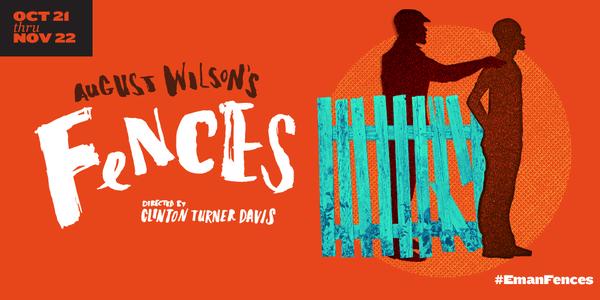You got to take the crooked with the straights, roll with the punches, and prepare to tackle death when it comes. The August Wilson classic Fences slides into the second show slot of the 25th Anniversary season at Everyman Theatre. Directed by Clinton Turner Davis, the play articulates the age-long struggle of man versus death and throws in the American classic kitchen sink drama of love, loss, and family in the process. Poignant and timely with strong performances on a glorious stage, Fences is the perfect drama to continue on the quarter-of-a-century season anniversary.
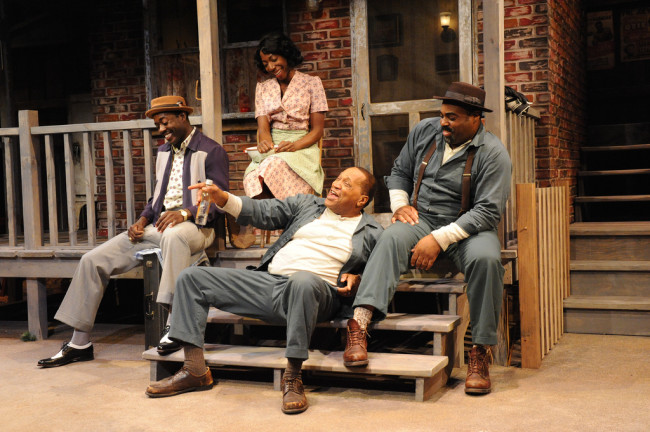
Building a literal and metaphorical fence around the front yard property of the Maxson household may take the entire performance, but the strikingly beautiful set constructed by Set Designer James Fouchard will take your breath away. Earthy, gritty, and the perfect picturesque still-life capture of an urban scene, Fouchard drapes the 1957 two-story brick house across the stage as if he’d shorn open the roof of the building and plopped it down from somewhere out on the streets of Baltimore. The attention to detail— particularly in the fading perspective depth design that echoes back to other row homes and the street beyond— is exquisite. The house could belong in any big-city neighborhood with Fouchard’s purposefully ambiguous detailing work making the aesthetic a universal approach that speaks to everyone.
Drawing the atmosphere momentarily out of its timeless existence and into the late 1950’s reality of Negro music, Sound Designer Elisheba Ittoop pulls blues music filled with soulful harmonic to fill the gaps of the scenic changes. Although Ittoop’s musical selections are the epitome of a match for the piece as a whole, the scenes do not flow evenly one to the next and the changes linger sometimes longer than they ought to in order to keep up the show’s overall momentum. This, along with pacing in the scenes of the entire first act of the show, is the only downfall that Director Clinton Turner Davis brings to the production. The second act, though still dragging in places, does a much more adamant job of moving along at a pace that echoes the emotional and dramatic builds of the show’s actions.
Starting off as a waxing-nostalgic tale of everyday ordinary life, the story’s narrative stretches out over several lengthy scenes where the action stagnates— half Wilson’s writing and developmental style and half the fault of Davis’ direction. Bono (Jason B. McIntosh) is introduced early on as the humorous yet level-headed supporting man in Troy’s life. McIntosh finds a stable balance between allowing for the humors to roll through his portrayal, like during moments when Troy attempts to get him to take sides in an argument with his wife Rose, but also tempers the truth of his position as Troy’s oldest friend with serious conversational tones later in the show. There is an earnest conviviality to the friendship that McIntosh develops with Troy’s character, even toward the end of the show when all of the relationship dynamics have shifted.
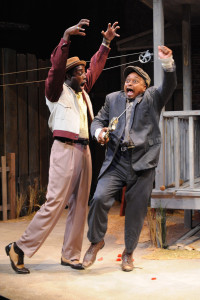
Lyons (Gary-Kayi Fletcher) bounces onto the scene with a spry step and a springy personality. Lover and liver of the slick-rick fast-talking lifestyle, Fletcher brings a much needed burst of energy to the slow meandering tales delivered in the style of Uncle Remus by Troy. Fletcher’s buoyancy uplifts the scenes in which he plays, particularly once he engages with Gabriel (Bryant Bentley) and has to live up to his namesake and roar like the king of the jungle. There is a solemnity in Fletcher’s portrayal when the moments call for it, displaying remarkable versatility as a performer to this rather static construct of a character. Bryant Bentley, as Troy’s brother Gabriel, does an astonishing job of portraying the man with a mental handicap. His physicality and vocal cadence are a realistic portrayal without overstepping the lines into offense or mockery. Bentley’s performance in the final scene is one of the most harrowing and yet simultaneously beautiful moments that happens in the production.
Rose (Joy Jones) holds her own in a play with only male characters. Jones is at first limited to the surface of Rose’s depth, humorous or intimate exchanges with Troy, heartfelt and tender exchanges with her son Cory (Brayden Simpson.) But as the play evolves, so too does the character of Rose and Jones follows suit with her fierce command of the character’s emotions, especially in the more dramatic shockers that are revealed in the show’s second act. Brutal speeches are delivered by Jones both defending and attacking Troy’s character throughout the production and her ability to master both is an exceptional trait to possess.
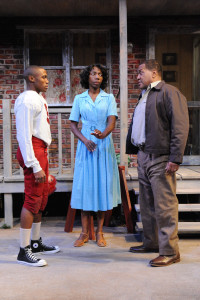
Simpson, as the young and eager son of Troy and Rose, is also simplistically deceptive in regards to the dynamic levels of the character. Seeming at first like the typical, albeit slightly rebellious, teenager, Simpson proves that the harshness of innocent father-son disagreement lives so much deeper within the fibers of his character’s being. Showcasing boundless growth from the first act to the second, Simpson transforms the character of Cory from a bright-eyed teen into a wizened young man, truly capturing the epitome of every youth’s journey from adolescence into manhood.
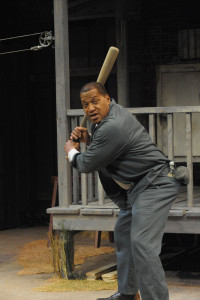
Troy (Alan Bomar Jones) is a storyteller. Jones and the character have this fact in common as he easily catches the attention of every ear in the house with his flavorful retellings of various events all through his life. Possessing vividly animated facial expressions and a simmering deep tone that imports a sense of comfort into these tales, Jones works the crowd over with his stories, making it that much more shocking when his temper flares or dramatic devices are revealed. Both times he addresses death in his powerful and somewhat bombastic monologues are captivating moments for the ages.
Despite the pacing the acting is superb and the scenic artwork is one for the records, making Fences well worth investigating this fall season at Everyman Theatre.
Running Time: 2 hours and 30 minutes with one intermission
Fences plays through November 22, 2015 at Everyman Theatre— 315 W. Fayette Street in the West End Entertainment District of Baltimore, MD. For tickets call the box office at (410) 752-2208 or purchase them online.

